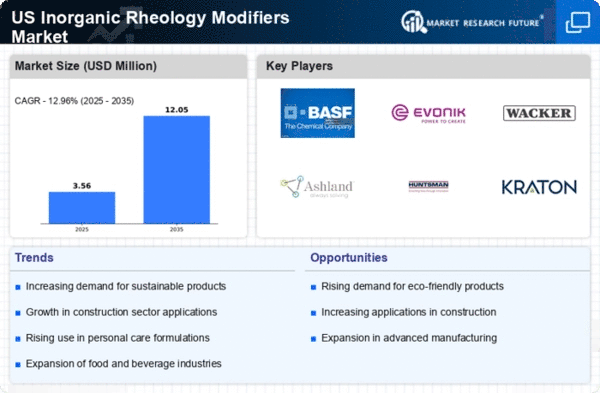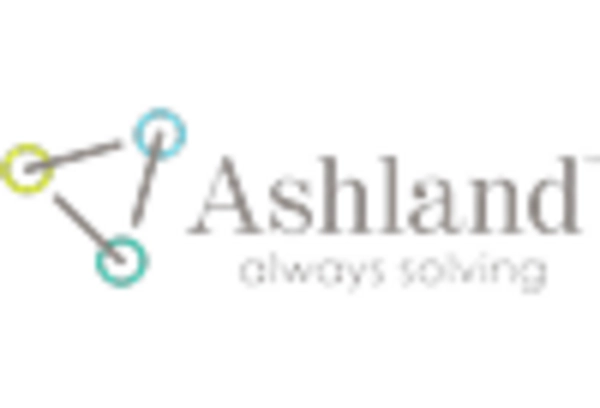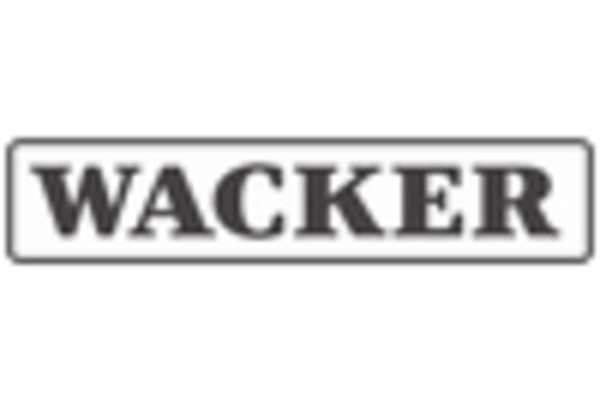Regulatory Compliance and Standards
The inorganic rheology-modifiers market is significantly influenced by the evolving regulatory landscape in the US. Stricter environmental regulations and safety standards are prompting manufacturers to reformulate their products to comply with these requirements. In 2025, it is anticipated that compliance costs could account for up to 15% of total production expenses in the chemical industry. This situation compels companies to invest in research and development to create inorganic rheology modifiers that not only meet regulatory standards but also offer enhanced performance characteristics. As a result, the market is likely to witness a shift towards more sustainable and compliant products, which could reshape the competitive landscape and drive innovation within the industry.
Increased Focus on Energy Efficiency
Energy efficiency is becoming a critical concern across various industries in the US, influencing the inorganic rheology-modifiers market. As companies strive to reduce energy consumption and operational costs, the demand for materials that enhance the performance of coatings, adhesives, and sealants is rising. In 2025, the market for energy-efficient building materials is expected to reach $100 billion, with inorganic rheology modifiers playing a pivotal role in improving the application and durability of these materials. By optimizing the viscosity and flow properties, these modifiers contribute to lower energy usage during application processes. This trend indicates a growing awareness among manufacturers to incorporate sustainable practices, which could further propel the demand for innovative inorganic rheology modifiers.
Rising Demand in Construction Sector
The construction sector in the US is experiencing a notable surge, which appears to be a significant driver for the inorganic rheology-modifiers market. As infrastructure projects expand, the need for high-performance materials that enhance the workability and stability of construction mixtures is increasing. In 2025, the construction industry is projected to grow by approximately 5.5%, leading to a heightened demand for rheology modifiers that can improve the flow and application of cement and concrete. This growth is likely to stimulate innovation in the formulation of inorganic rheology modifiers, catering to the specific needs of construction applications. Consequently, manufacturers are focusing on developing products that not only meet performance standards but also comply with regulatory requirements, thereby driving the overall market forward.
Growth in the Paints and Coatings Industry
The paints and coatings industry in the US is undergoing substantial growth, which appears to be a key driver for the inorganic rheology-modifiers market. With a projected CAGR of 4.2% through 2025, the demand for high-quality coatings that provide superior performance is increasing. Inorganic rheology modifiers are essential in achieving the desired viscosity and stability in paint formulations, thereby enhancing application properties. This growth is further fueled by the rising consumer preference for eco-friendly and low-VOC (volatile organic compounds) products, prompting manufacturers to innovate and adapt their offerings. Consequently, the inorganic rheology-modifiers market is likely to benefit from this trend, as companies seek to develop products that align with environmental standards while meeting performance expectations.
Technological Innovations in Material Science
Technological advancements in material science are playing a crucial role in shaping the inorganic rheology-modifiers market. Innovations in nanotechnology and polymer chemistry are enabling the development of new formulations that enhance the performance of rheology modifiers. In 2025, the market is expected to see a rise in the adoption of advanced materials that offer improved stability and functionality. These innovations could lead to the creation of products that not only meet the demands of various applications but also provide cost-effective solutions for manufacturers. As companies invest in research and development, the inorganic rheology-modifiers market is likely to experience a wave of new products that cater to the evolving needs of industries such as construction, automotive, and consumer goods.

















